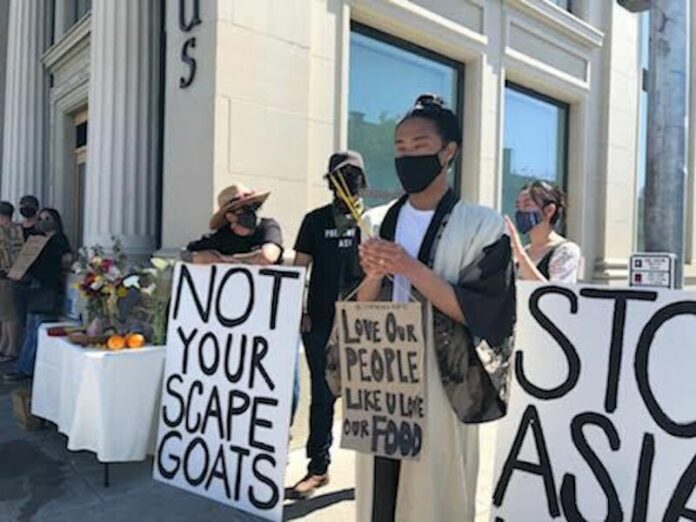A small group of demonstrators with signs gathered on the corner of Main Street and Bodega Avenue in downtown Sebastopol at noon on March 28, to honor survivors and lives lost to recent and historic anti-Asian violence.
Adrian Chang of Occidental organized the demonstration as well as an altar and ritual for Qing Ming, a holiday celebrated among Chinese and many other Asian communities out of reverence for one’s ancestors that typically takes place 15 days after the spring equinox, he said. Strung around his neck was a sign that read, “LOVE OUR PEOPLE LIKE U LOVE OUR FOOD.”
The altar was particularly dedicated to the victims killed in the March 16 Atlanta spa shootings and Vicha Ratanapakdee, an 84-year-old Thai American man shoved to the ground in San Francisco who later died of his injuries.
“I’m here to send off our now-ancestors who are no longer with us and make sure that we send them off with the dignity that they deserve,” in addition to the survivors of the attack in Atlanta, Chang said. He said he did not include the names of the victims because he understood some of their families to prefer their names be kept private.
Kaya Sakaguchi attended the event as well as a previous Asian American and Pacific Islander (AAPI) solidarity event in Santa Rosa. She said the recent racist letter targeting the AAPI business community in Healdsburg brought up a lot of pain and that the Trump administration actions in 2020 “is the reason why most of the hate that’s happening is happening.”
The six attendees grew to 10 over the event that lasted roughly an hour and a half. Two people held massive signs that read, “NOT YOUR SCAPEGOATS” and “STOP ASIAN HATE.”
Chang led friends in a modified ritual for Qing Ming at the altar, sounding a small Chinese cymbal, or gong, to chase evil spirits away and bowing in prayer three times before lighting incense. Afterwards, he and friends presented offerings of oranges, money, fabric and kites for ancestors to enjoy in heaven, pouring green tea across the sidewalk before the altar, he explained.
He said certain aspects were modified to do in public, like green tea instead of rice wine and taking materials home to burn as a final send off, as well. Normally, the practice would be done at the graves themselves, he said.
Many drivers passing through the intersection of Bodega Avenue and Main Street honked in support, although one woman called out of her car window, “Stop all hate!” Chang said another woman came through who challenged one of the protest signs and another told the organizer and his friends not to forget about people at the border.
Chang said he understood many different communities of color feel upset, isolated, endangered and forgotten and sometimes people pitch in, even though the event was intended to address racism targeting the AAPI community in particular.
Recognizing white supremacy as “the real demon here we all need to fight” is key and that challenging white supremacy requires that different communities of color come together in solidarity, he said.
The overall pushback was milder than he expected, he said, sharing he had felt nervous coming out in public to hold the event and that the AAPI community felt afraid to leave their homes. “And I’ve experienced my own amount of racism here, even outside of the pandemic,” he said. “People feel so liberated to attack us and harm us, and I just didn’t know how unpredictable everybody would be today.”
He said people feel especially bold in their racism toward Asians as longtime scapegoats stereotyped as submissive, adding, “People don’t mind saying things to our faces like that because they assume we’re not going to fight back. Because they assume we’re weak, because they assume that we’re meek.”
In an interview following the demonstration, Chang said a frequent obstacle in conversations about racial justice is when people become defensive and challenge or interrupt the AAPI community and Black, Indigenous and people of color (BIPOC) communities overall on their experiences, often in instances of “white fragility,” a term used to describe when white people in particular express defensiveness or discomfort when hearing about racial inequality.
“When an Asian person is talking to you about this stuff, just let them talk about it. You don’t need to give them your solutions. You don’t need to tell them, oh, well, look at it this way or what about this. Just listen,” he said. “And I think it’s really when we get to a point when we’re willing to just swallow our pride and just listen to what someone has to say, I think that’s when we can really make a lot of progress.”
61.6
F
Healdsburg
April 19, 2025








